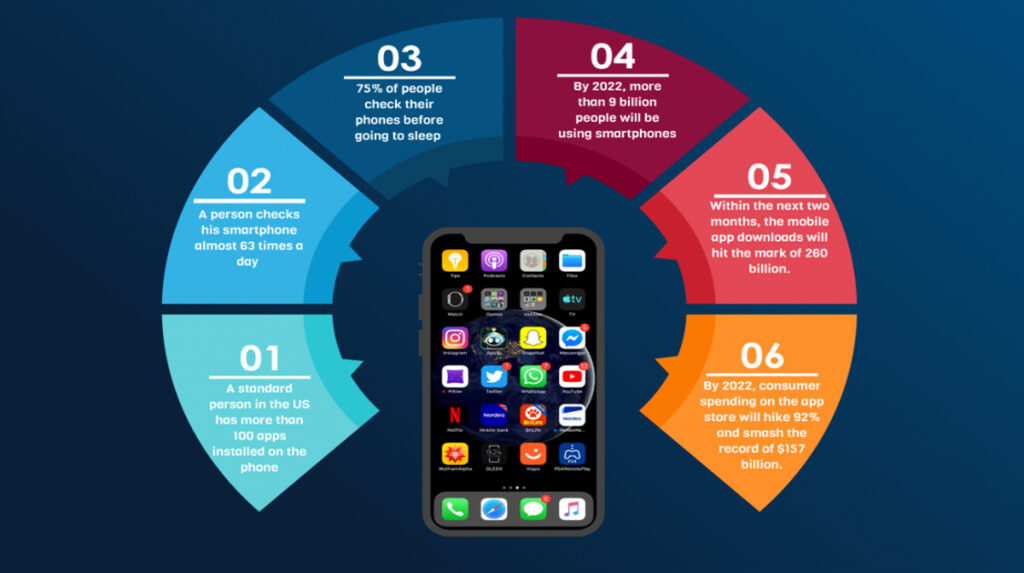
Mobile app technology encompasses the software and hardware technologies, development processes, and methodologies used for designing, building, and maintaining mobile applications. These applications are designed to run on mobile devices such as smartphones and tablets.
Here’s an overview of the key aspects of mobile app technology:
Platforms
The primary platforms for mobile app development are:
- iOS: Developed by Apple Inc., iOS is the operating system for iPhone devices. iOS apps are primarily developed using Swift or Objective-C.
- Android: Developed by Google, Android is the most widely used mobile OS globally. Android apps are typically developed using Java or Kotlin.
Development Approaches
- Native Apps: These are developed specifically for one platform (iOS or Android) using the languages and development tools supported by those platforms (e.g., Xcode for iOS and Android Studio for Android).
- Cross-Platform Apps: These are developed using frameworks like React Native, Flutter, and Xamarin, which allow developers to use a single codebase to build apps that run on both iOS and Android.
- Hybrid Apps: These apps are developed using web technologies (HTML, CSS, and JavaScript), which are then wrapped in a native container using platforms like Cordova or Ionic. They can access some native platform features but generally have performance limitations compared to native apps.
- Progressive Web Apps (PWAs): PWAs use modern web capabilities to deliver an app-like experience to users. They are accessible through browsers and offer a high level of performance and integration, approaching that of native apps.
Key Technologies
- Languages: Swift, Objective-C, Java, Kotlin, JavaScript, Dart (for Flutter), C# (for Xamarin).
- Frameworks and Libraries: React Native, Flutter, Xamarin, Ionic, Cordova.
- IDEs and Development Tools: Xcode, Android Studio, Visual Studio Code, IntelliJ IDEA.
Development Considerations
- User Interface and User Experience (UI/UX): Mobile apps must be designed with a focus on usability, aesthetics, and responsiveness. The design must adapt to different screen sizes and orientations.
- APIs and Integration: Apps often need to interact with external services and systems via APIs. Secure and efficient API integration is crucial for functionality such as payments, social media sharing, or data synchronization.
- Performance Optimization: Mobile devices have limited resources, so optimizing performance (memory usage, battery life) is essential.
- Security: Mobile apps must handle data securely, implement proper authentication and authorization, and ensure data encryption when necessary.
- Testing: Comprehensive testing, including unit testing, integration testing, and UI testing, is crucial. Tools like Espresso for Android and XCTest for iOS are popular.
- Deployment: Apps are distributed through app stores (App Store for iOS, Google Play for Android). The deployment process involves submitting apps for review, adhering to platform-specific guidelines and policies.
Emerging Trends
- Machine Learning and AI: Integrating AI functionalities, such as voice recognition and predictive analytics, into mobile apps.
- Internet of Things (IoT): Developing apps that communicate with IoT devices like wearables and smart home devices.
- Augmented Reality (AR) and Virtual Reality (VR): Implementing immersive technologies for enhanced user experiences.
- Blockchain: Secure transactions and data management in apps, especially for finance and supply chain sectors.
Mobile app technology is continually evolving, driven by advances in hardware capabilities, changes in user expectations, and new development methodologies. Understanding these can help developers and businesses to leverage mobile applications more effectively, enhancing user engagement and achieving business goals.